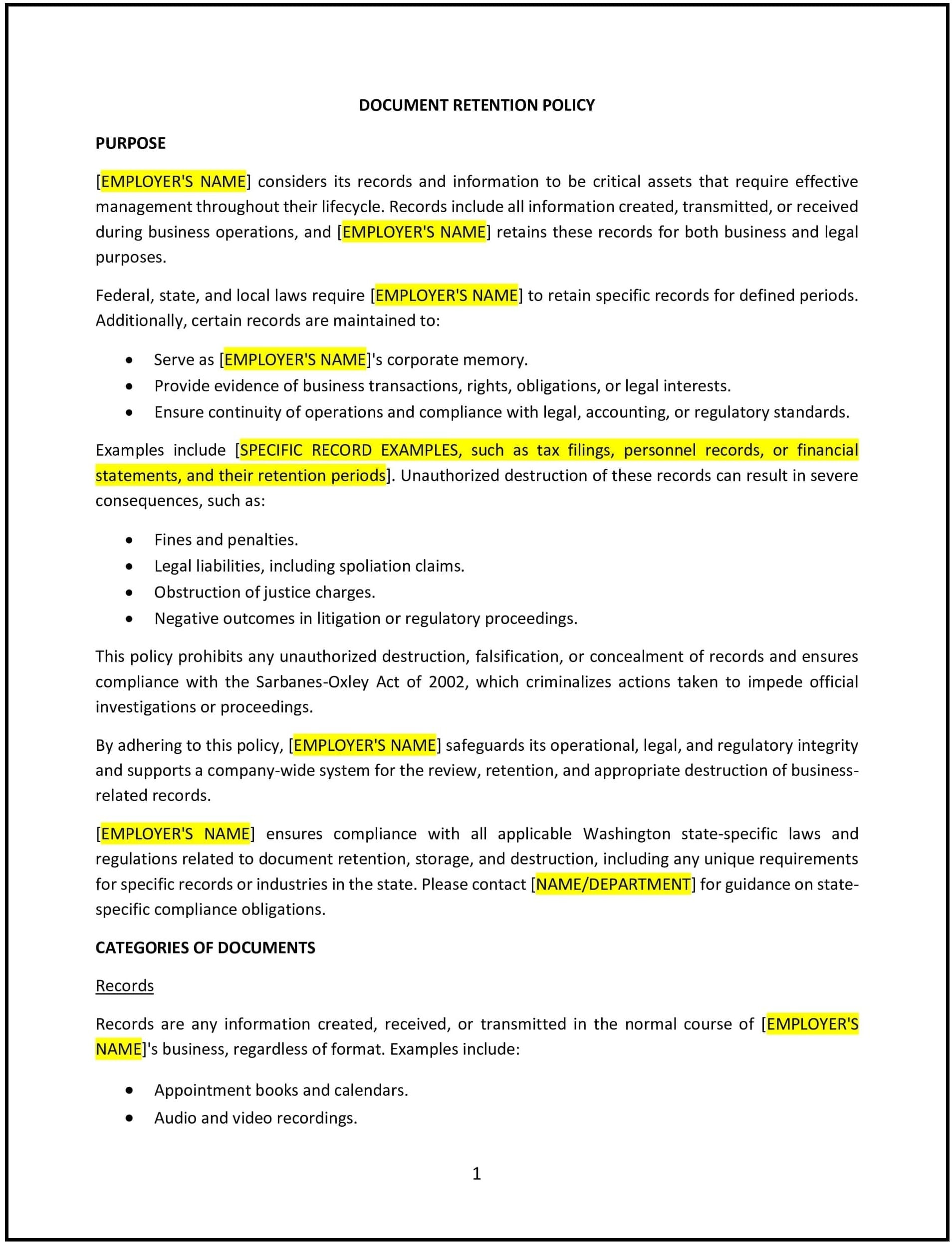Document retention policy (Washington): Free template
Got contracts to review? While you're here for policies, let Cobrief make contract review effortless—start your free review now.

Customize this template for free
This document retention policy is designed to help Washington businesses manage and maintain their records in compliance with state and federal regulations. It outlines the processes and timeframes for retaining, storing, and disposing of documents, both physical and electronic. The policy ensures that businesses keep necessary records for legal, regulatory, and operational purposes, while minimizing the risks associated with retaining outdated or unnecessary documents.
By adopting this policy, businesses can support compliance with record-keeping regulations, enhance operational efficiency, and protect sensitive information from unauthorized access or loss.
How to use this document retention policy (Washington)
- Define the types of documents covered: Clearly outline the types of documents that are subject to retention under this policy, such as financial records, contracts, employee files, tax documents, and emails. Include specific categories of documents based on the company’s operations and industry requirements.
- Set retention periods: The policy should specify how long each type of document should be kept. Retention periods should comply with Washington state laws, federal regulations, and industry standards. Include different retention periods based on the document’s type (e.g., tax documents might need to be kept for seven years, while certain contracts may require permanent retention).
- Specify storage and security requirements: Outline how documents should be stored to ensure they are secure and easily accessible. This includes physical storage (filing cabinets, archives) and electronic storage (secure servers, cloud storage). The policy should include guidelines for protecting confidential and sensitive documents from unauthorized access.
- Define disposal procedures: The policy should establish the process for safely disposing of documents once the retention period has expired. This may include shredding physical documents or securely deleting electronic records. It should ensure that confidential information is properly destroyed to avoid potential data breaches.
- Address electronic records: The policy should specify how electronic records are managed, including guidelines for backing up data, maintaining digital copies, and ensuring the security of digital documents. It should include provisions for ensuring electronic records are as accessible and legally compliant as their physical counterparts.
- Ensure compliance with Washington and federal laws: The policy should promote compliance with Washington state records retention laws and federal regulations, such as the Sarbanes-Oxley Act, HIPAA, and IRS requirements. It should help businesses understand and meet the minimum legal requirements for document retention.
- Review and update regularly: Periodically review and update the policy to reflect any changes in Washington state laws, federal regulations, or industry standards. Regular reviews will ensure the policy remains relevant and effective as business operations evolve.
Benefits of using this document retention policy (Washington)
This policy offers several benefits for Washington businesses:
- Promotes legal compliance: By adhering to the document retention guidelines, businesses can meet the legal requirements for record-keeping and avoid potential fines, penalties, or legal challenges related to improper document management.
- Protects sensitive information: The policy helps businesses protect confidential and sensitive data from unauthorized access by ensuring that documents are stored securely and disposed of properly when no longer needed.
- Enhances operational efficiency: By having a clear document retention policy, businesses can organize their records effectively, making it easier to retrieve necessary documents and improving overall efficiency in managing company records.
- Reduces storage costs: Proper document retention ensures that only necessary documents are kept, which helps businesses save on physical storage space and reduce the costs associated with maintaining unnecessary records.
- Supports audit readiness: The policy helps businesses prepare for audits by ensuring that records are kept for the required amount of time and are organized in a way that makes them easily accessible when needed.
- Prevents data breaches: By implementing secure document storage and disposal practices, businesses can reduce the risk of data breaches or identity theft caused by improper handling of sensitive documents.
Tips for using this document retention policy (Washington)
- Communicate the policy clearly: Ensure all employees understand the document retention policy and their responsibilities in handling company records. Include the policy in the employee handbook, review it during onboarding, and provide periodic refresher training.
- Implement secure storage solutions: Use secure systems and methods for storing physical and electronic records, such as password-protected digital storage and locked cabinets for sensitive physical documents.
- Monitor compliance: Regularly audit the company’s records management practices to ensure compliance with the document retention policy. This will help identify any gaps in the retention or disposal processes.
- Regularly dispose of unnecessary documents: Ensure that expired documents are promptly disposed of according to the policy, minimizing the risk of retaining unnecessary or outdated records.
- Review and update regularly: Periodically review the policy to ensure it remains compliant with Washington state laws, federal regulations, and any changes in the company’s operations or record-keeping practices.